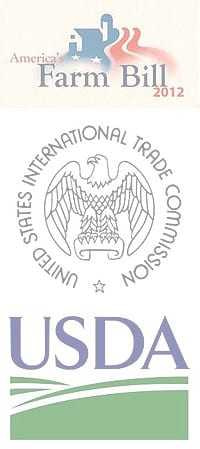 Three fronts in the efforts by American olive oil producers and their supporters to strengthen olive oil standards and competitiveness are rapidly converging. The fronts are: negotiations for the Farm Bill in Congress that would add olive oil to the list of products under import controls; the push for a federal marketing order for olive oil standards; and the USITC investigation of olive oil’s global competitiveness. Each of these efforts is progressing, but resolution and impacts will not likely occur quickly.
Three fronts in the efforts by American olive oil producers and their supporters to strengthen olive oil standards and competitiveness are rapidly converging. The fronts are: negotiations for the Farm Bill in Congress that would add olive oil to the list of products under import controls; the push for a federal marketing order for olive oil standards; and the USITC investigation of olive oil’s global competitiveness. Each of these efforts is progressing, but resolution and impacts will not likely occur quickly.
Farm Bill 2012
U.S. Congressional Farm Bill 2012 has a provision that would amend Section 8e of the Agricultural Adjustment Act to include olive oil in the list of commodities already under import controls. Although the U.S. Senate version of the bill did not include the provision; the version that cleared the House of Representatives Agriculture Committee did contain it.
The next step is for the bill to be considered by the full House before December 31, 2012 when the current five-year bill and many of its provisions expire. U.S. House Agriculture Committee Ranking Member Collin Peterson is pushing to get the bill on the floor before the deadline and is “opposed to an extension of any kind for any time.”
Even if the House passes the bill, a conference committee made up of members from both the Senate and the House would have to work out differences in their versions of the bill. The conference committee would then submit a report to be approved by both the House and the Senate. These actions would all have to occur by December 31 for the bill to become law, explained Ben Mosely from the office of Senator Chambliss of Georgia.
Passage of the Farm Bill by the end of the year is uncertain because discussions over the economic fiscal cliff have “soaked up all the political oxygen,” said a spokesperson from the House Committee on Agriculture.
If the Farm Bill doesn’t pass, there could be a temporary extension of the current law, but the new provisions, including the one for olive oil, would probably not be automatically included. A new farm bill would have to be reintroduced next year and the process would start from scratch.
Federal Marketing Order
In January 2012, American olive oil producers proposed a draft federal marketing order for olive oil. The order would establish new quality standards for U.S. produced olive oil, set characteristics of olive oil grades and require olive oil inspections and certification.
The marketing order and the Farm Bill are separate but linked actions. If the Section 8e provision in the Farm Bill is passed, it would mean that olive oil importers would have to meet the same standards as domestic producers. Those standards would be defined by the marketing order and enforced by the U.S. Department of Agriculture (USDA). However, without a marketing order in place, Section 8e has no teeth.
“Section 8e would have no quality standards and nothing to enforce without a federal marketing order,” explained Alex Ott, Executive Director of the California Olive Committee.
Although an advisory group has a working draft of a marketing order, Ott emphasized that no federal marketing order for olive oil has been formally introduced. “The industry has not put together a draft that has gone forward to the USDA.”
Even if a marketing order is drafted, there are many steps that have to occur before it can be approved. “There is a lengthy public process and it could take from eighteen months to two years for a draft to become an approved federal marketing order,” said Ott.
Ott is puzzled by the outrage from some camps over discussions of a marketing order. “Other countries already have quality standards in place but now that the U.S. is talking about having them, people are opposing them even before we have discussions.”
“The bottom line is that consumers need confidence in what they’re buying. So, the question is, how are we going to get there?” asks Ott.
USITC Investigation
In October 2012, the U.S. International Trade Commission (USITC) launched an investigation of global market competition and practices that confront the U.S. olive oil industry.
The USITC is currently in “the information gathering process,” said Peg O’Laughlin, Public Affairs Officer. Briefs and written submissions from the public have been filed with the Commission and over twenty growers, producers, industry organizations, universities and other interested parties have requested an appearance at the upcoming hearing.
The hearing will be held on Wednesday, December 5, 2012 at 10:30 am at the U.S. International Trade Commission Building in Washington.
Following the hearing, further written submissions will be received until February 13, 2013 and the Commission report will be released on August 12, 2013.
Since it is a fact-finding investigation, no policy recommendations will come out of the process. The USITC will report its results to the U.S. House of Representatives Committee on Ways and Means. However, USITC investigations similar to this one “are often followed by U.S. trade actions that can have a trade impact, including limiting imports,” explained Dr. Peter Koenig in an Olive Oil Times report.
Despite movement in the Farm Bill, marketing order and USITC investigation, none of these actions alone is likely to have an impact on the industry immediately, however the existence of the fronts, and the opposition to them, are clear evidence of the growing strength and voice of the U.S. domestic olive oil industry.
